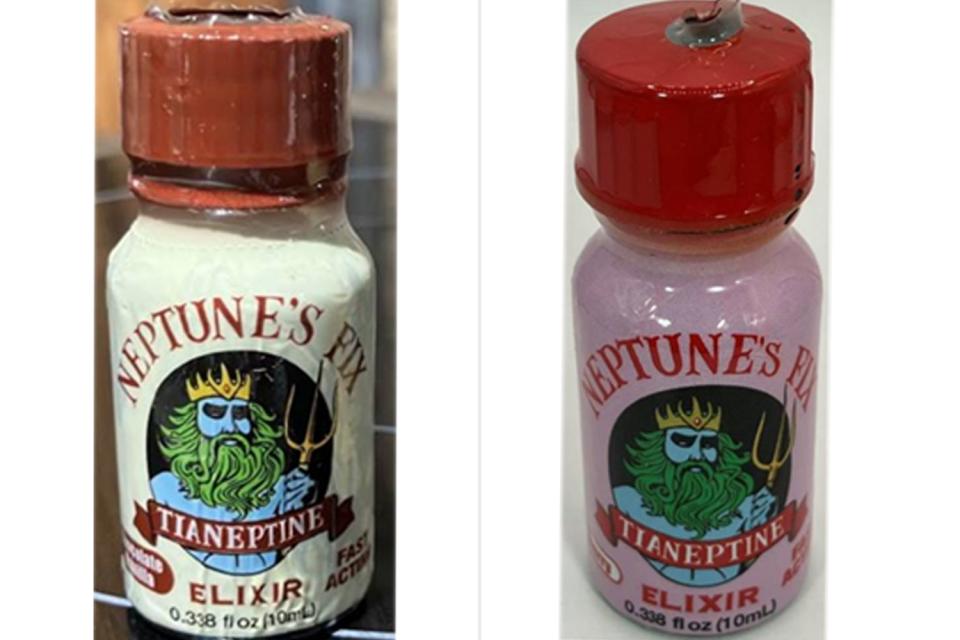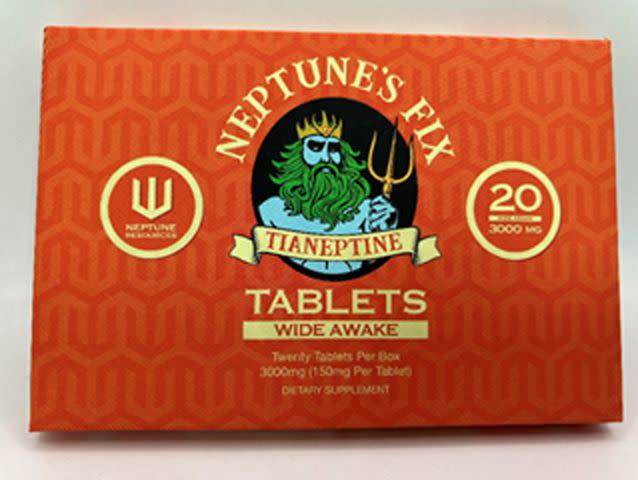'Gas Station Heroin' Supplement Recalled for Risk of 'Suicidal Ideation' and Other 'Life-Threatening Events'
Marketed as "happiness in a bottle" Neptune’s Fix Elixir contains tianeptine, which may have contributed to a “cluster of severe illness” in New Jersey

FDA
Neptune's Fix Elixir has been recalled.Neptune's Fix, a supplement marketed as "happiness in a bottle," has been recalled because it contains tianeptine, which is not approved by the FDA
The supplement is sold in convenience stores and gas stations, which has earned it the nickname "gas station heroin"
It's been linked to hospitalizations in New Jersey, where synthetic cannabinoids were found in samples of the product.
A supplement known as “Neptune’s Fix” has been recalled, the Food and Drug Administration announced, due to “a reasonable probability of life-threatening events.”
Those include “suicidal ideation or behavior for children, adolescents, and young adults 25 and younger,” the recall announcement said.
The supplement — whose logo is a cartoon depiction of King Neptune — comes in tablet form, or as a drinkable beverage in flavors like cherry and lemon. It’s sold at gas stations and convenience stores, which has earned it the nickname “gas station heroin,” NBC News says.
The “elixir” contains tianeptine, an anti-depressant which is not FDA-approved for medical use.
Last year, there was an “uncharacteristic spike” in tianeptine exposure reported to New Jersey’s Poison Control Center, the CDC says, causing a “cluster of severe illness.”
There were 17 cases where “severe clinical effects” were reported; 14 of those patients had taken Neptune’s Fix, the CDC says, adding that “synthetic cannabinoids” were found in some samples of the elixir taken by the patients.

FDA
Neptune's Fix Elixir and Tablets have been recalled.“Usually we might see something like this in 1 in 100 poisonings,” Dr. Pieter Cohen, an associate professor at Harvard Medical School, told NBC News.
“That’s potentially an incredibly potent mixture of drugs.”
Synthetic cannabinoids are associated with "severe health problems," the National Institute on Drug Abuse says, and some of those can be "life-threatening."
Related: 1 Child Dead, 3 Hospitalized After New York City Daycare Incident Involving 'Opioid Exposure'
All the patients had “altered mental status,” and medical complications included tachycardia (rapid heart rate), hypotension (low blood pressure), seizure — and one went into cardiac arrest.
Thirteen of the patients ended up hospitalized in the intensive care unit; seven were intubated. It's not clear, however, if all the patients were exposed to the synthetic pot.
Never miss a story — sign up for PEOPLE's free daily newsletter to stay up-to-date on the best of what PEOPLE has to offer, from celebrity news to compelling human interest stories.
“The presence of tianeptine renders the products unapproved drugs for which safety and efficacy have not been established and, therefore, are subject to recall,” the FDA explained in its announcement.
The agency has previously issued dire warnings against products containing tianeptine, claiming manufacturers are “making dangerous and unproven claims that tianeptine can improve brain function and treat anxiety, depression, pain, opioid use disorder, and other conditions.”
However, those with a history of opioid abuse may be at “particular risk” of abusing it, the FDA said.
“Individuals could unintentionally overdose and experience serious and potentially life-threatening risks including confusion, seizures, drowsiness, dry mouth, and shortness of breath, which may be exacerbated by alcohol use,” the FDA said.
In its statement, the manufacturer of Neptune's Fix Elixir, said, "Neptune Resources LLC's distribution channels have not reported any adverse events from the use of its products" and that they are "proactively notifying its distributors and customers by form of a mailed out recall letter and is arranging for the return of all recalled products."
If you or someone you know is struggling with substance abuse, please contact the SAMHSA helpline at 1-800-662-HELP.
For more People news, make sure to sign up for our newsletter!
Read the original article on People.


